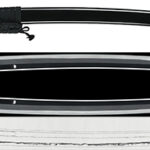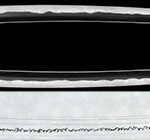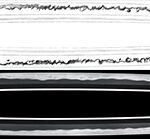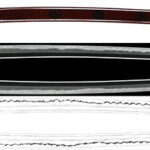Ordering Number: 24471
Katana: Shirasaya with Koshirae (NBTHK Tokubetsu Hozon Token)
Signature: Siishinshi Masatsugu (written seal mark)
Ansei 5 nen 8 gatsu Kichijitsu (August, Ansei 5, 1858)
We divide 4 sections for each sword as Saijyo Saku, Jyojyo Saku, Jyo Saku, and Regular Saku.
This work is rated as Jyojyo Saku.
Habaki: gold-foiled habaki
Blade Length: 70.5cm (27.8in)
Curvature: 1.4cm(0.5in)
Mekugi Hole: 1
Width at Base (Motohaba): 3.1cm (1.2in)
Width at Tip (Sakihaba): 2.06cm(0.6in)
Thickness: 0.76cm (0.3in)
Sword Weight: grams
Era: the end of the Edo period (1858)
Shape: wide and thick blade with long kissaki.
Jigane: fine Ko-itame hada
Hamon: Ko-niedeki gunome-midare with Ko-ashi. Boshi is rounded and hakikake.
Features: Suishinshin Masatsugu, pupil of Naotane and was adopted son of Suishinshi Masahide, excelled in the Soshu style of swordsmithing and left works of outstanding quality.
Suishinshi Masahide, Masatsugu's farther-in-law, leading swordsmith of Shinshinto period, produced a modest style of swordsmithing, with a small alternating grain pattern, because he believed that Shinto were fragile and Koto(old swords) were strong and ideal. His idea that the old sword was the ideal was supported by many swordsmiths and became the trend of the end of the Edo period.
Koshirae
Tsuba: Round-shaped iron tsuba with gold-inlaid design
Menuki: a picture of Gunbai, a war fan.
Fuchi: Shakudonanako base carved with bundled straw, a sickle, and a coolie hat.
Kashira: Shakudonanako base carved with a lily
NBTHK Tokubetsu Hozon Paper
Aoi Art estimation paper
Whole Oshigata
Price:1,700,000JPY
Order Form
Related Items:
 Katana: Hizen Koku Tadayoshi (8th generation)(NBTHK Tokubetsu Hozon Token)
Katana: Hizen Koku Tadayoshi (8th generation)(NBTHK Tokubetsu Hozon Token)
 Katana:Soushi Chikuzen Daijo Taikei Naotane(Kao)(NBTHK Tokubetsu Hozon Token)
Katana:Soushi Chikuzen Daijo Taikei Naotane(Kao)(NBTHK Tokubetsu Hozon Token)
 Katana: Sakuyo Bakushita-shi Hosokawa Masayoshi (NBTHK Tokubetsu Hozon Token)
Katana: Sakuyo Bakushita-shi Hosokawa Masayoshi (NBTHK Tokubetsu Hozon Token)
 Katana : Tame Otsuka Kazunobu Kun Sekido Unju Korekazu Seitan saku kore (23th NBTHK Juyo Certificate)
Katana : Tame Otsuka Kazunobu Kun Sekido Unju Korekazu Seitan saku kore (23th NBTHK Juyo Certificate)
 Katana: Matsumura Masanao.
Katana: Matsumura Masanao.
 Katana:Soushi Jiro tarou Naokatsu(NBTHK Tokubetsu Hozon Token)
Katana:Soushi Jiro tarou Naokatsu(NBTHK Tokubetsu Hozon Token)





